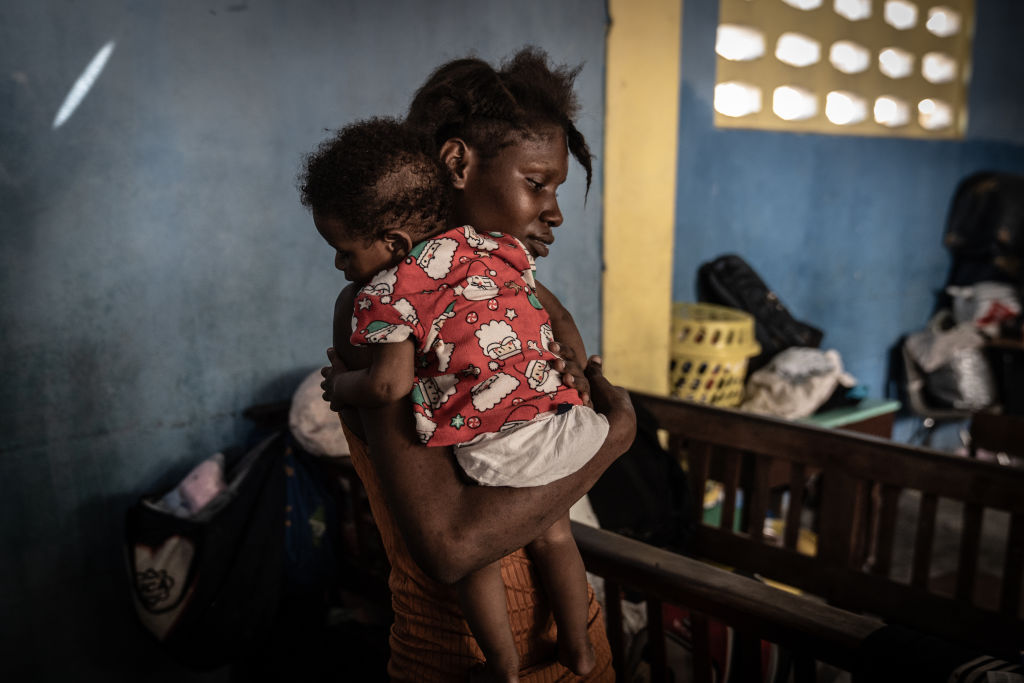Kenyan police could make Haiti's problems worse
Haiti has a history of disastrous foreign interventions. Kenyan police are accused of brutality. Now the two will mix.


A free daily email with the biggest news stories of the day – and the best features from TheWeek.com
You are now subscribed
Your newsletter sign-up was successful
Haiti has a long history of violence and chaos. It also has a long history of outsiders coming in ostensibly to bring order, but instead creating even more problems for the country's people. Will that history continue? CNN reported this week that the United Nations has given approval for Kenyan police to lead a multinational force to help get Haiti's gang violence under control. But critics say the Kenyan police force has a pattern of brutality that includes "extrajudicial killings and arbitrary execution of protestors."
There's no doubt that Haiti is in dire need of help. "Gangs have terrorized civilians" for two years, committing thousands of murders since the assassination of President Jovenel Moïse in 2021, Ellen Ioanes of Vox pointed out. Haitian police are "outgunned and underpaid," so many observers believe "an external force of some kind" is necessary. But previous interventions by outsiders are remembered mostly for their exploitation of the country — along with more killings, a cholera epidemic and widespread sexual abuse. All of which raises a question: "Will this be different from previous international interventions?"
Kenya does have a history of peacekeeping operations, Al Jazeera reported. And the African country stands to gain prestige if the Haiti mission is successful. "On the global stage, sending its forces to Haiti gives Kenya ... very serious political capital," said one analyst. Those gains could be undercut, though, if this intervention ends up as yet another disaster.
The Week
Escape your echo chamber. Get the facts behind the news, plus analysis from multiple perspectives.

Sign up for The Week's Free Newsletters
From our morning news briefing to a weekly Good News Newsletter, get the best of The Week delivered directly to your inbox.
From our morning news briefing to a weekly Good News Newsletter, get the best of The Week delivered directly to your inbox.
'Kenyan police are rogue'
Human rights groups say that "Kenyan police officers have shot and beaten hundreds of protesters this year," The New York Times reported. That raises concerns that the ostensible peacekeepers "will put civilians in harm's way" as they combat Haiti's gangs. Kenya was chosen for the mission to avoid "what might look like a Western occupation of a developing country." And Kenya's leaders say the country's peacekeeping missions have an "impeccable" record. That's questionable. Said one victim of the alleged brutality: "Kenyan police are rogue."
"Haiti has been treated as a ward of major powers … for decades," Daniel Larison argued at Responsible Statecraft. The Kenya-led intervention has "even less support and fewer resources than previous efforts," which makes it "foolish" to think that it can end up with a better outcome. A Haitian-led solution is needed, not another intrusion by outsiders. "No matter how well-intentioned the Kenyan-led mission may be, it is a mistake."
"As strange and unsavory as a Kenyan-led multinational force sounds, it's a solution that deserves a chance," The Boston Globe editorialized. The U.S. can't play a direct role — the American "history of ill-fated interventions in Haiti" means it has to step back and be supportive of other efforts. Backing Kenya's mission "may represent the most realistic way" for the U.S. to help Haiti. It's necessary to try. "Unfortunately, as bad and unprecedented as things are in Haiti right now, they can always get worse."
No U.S. troops
The U.S. is backing Kenya's mission, The Miami Herald reported. The State Department and Department of Defense have pledged $100 million each to the effort, though the particulars of how that money will be used is "not immediately clear." One thing that is clear: The U.S. won't be sending any of its own troops to Haiti. "The U.S. military will provide some enabling support," a White House spokesman said.
A free daily email with the biggest news stories of the day – and the best features from TheWeek.com
Meanwhile, the Kenyan police deployment isn't fully supported within Kenya. The Associated Press reported that opposition lawmakers are insisting that parliament approve the mission to Haiti. Assuming the deployment goes forward, though, Kenyan forces face a difficult task under the best of circumstances: "neutralize the armed gangs, protect civilians, and bring about peace, security and order," BBC pointed out. Haiti's history, a past filled with disastrous interventions, and the questions regarding Kenyan police only add to the challenge. The outsiders "will need to be careful to avoid innocent civilian casualties," BBC noted, "and also to win the 'hearts and minds' battle too."
Joel Mathis is a writer with 30 years of newspaper and online journalism experience. His work also regularly appears in National Geographic and The Kansas City Star. His awards include best online commentary at the Online News Association and (twice) at the City and Regional Magazine Association.
